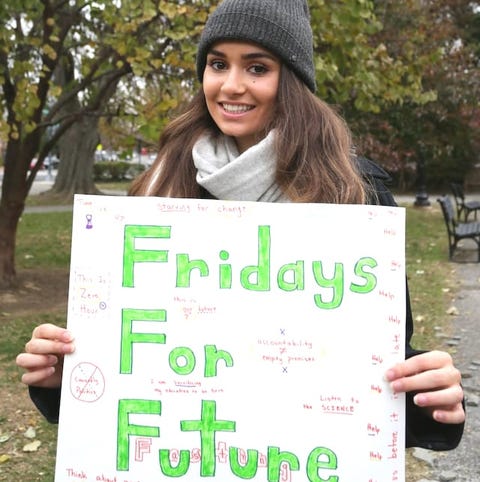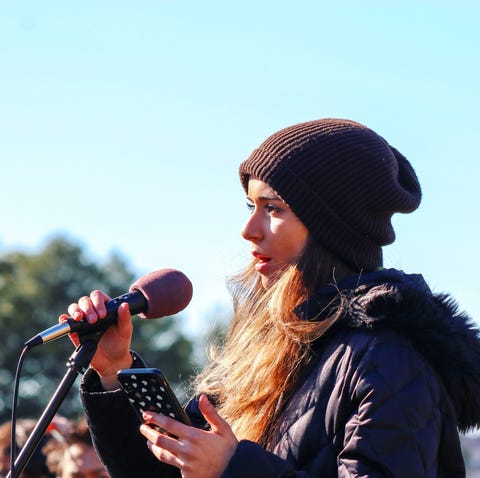
Just before taking a family trip to Iran seven years ago, Sophia Kianni’s middle school teacher stunned her with a statistic: By 2030, temperatures in the world’s warmest regions are expected to increase by more than twice the global average.
When Kianni arrived in Tehran—where her aunts, uncles, and grandma all live—she got an even bigger surprise: Her family had no idea. “They didn’t know anything about climate change,” Kianni, now 19, tells ELLE.com. “In part because they couldn’t find information available online in Farsi.”
Kianni, who is bilingual, started translating English-language articles on climate change into Farsi and sending them to her family via WhatsApp. She still remembers how saddened they were to learn about the state of the planet—and how afraid they were for its future.
Since then, Kianni has helped translated 6,000 pages of critical information into Farsi and other languages with help from a global army of volunteer translators that call themselves “Climate Cardinals.”
“My experience with my family was not unique,” says Kianni, who founded the group. “The inaccessibility of climate information is a widespread issue that affects [many] people.”

Sophia Kianni at a Fridays For Future rally.COURTESY SOPHIA KIANNI
Climate Cardinals, now an international nonprofit, is made up of 8,000 translators all helping to make climate information more accessible. They are mostly young volunteers, and speak more than 100 languages—from Kanuri to Hausa to Bulgarian. Kianni, who is a college freshman, believes her organization’s mission—to make sure that every person, regardless of the language they speak, can learn about climate change—is key to solving the crisis.
“People unable to access sufficient climate change research and information due to linguistic barriers are the most vulnerable to its effects,” she says. “Consequently, those communities are left voiceless, and often lack access to the research and information they need to champion impact mitigation and climate change prevention.”
The organization operates in 41 countries, where volunteers operate local chapters. The chapters are often run by students, who help select which documents to translate, focusing on resources that will benefit their communities.

Sophia Kianni speaking at a climate rally in D.C.COURTESY SOPHIA KIANNI
For records that are highly technical or lengthy, the group’s volunteer base works with professional translators. Climate Cardinals also has a board of professional translators with several hundred members to help proofread. Once documents have been authenticated, they are uploaded to the Climate Cardinals website for anyone to access.
Because the organization operates remotely, Kianni says there has been an increase in volunteers during the pandemic. “[Activists] want a way to be able to continue their climate work virtually, from the safety of their homes,” she says. “The pandemic has taught me how to better leverage social media to mobilize [other] young people from around the world to work on climate advocacy.”
Ahead of Earth Day, Kianni moderated a panel about the crises of climate change, COVID-19, and nuclear challenges on Pacific and First Nations communities. “It’s important to address climate change to protect the health and lives of everyone, including those most impacted by climate such as communities of color,” she says. “Climate change education empowers us to understand environmental problems in our communities and how they affect us.”
Photo Source and 2





